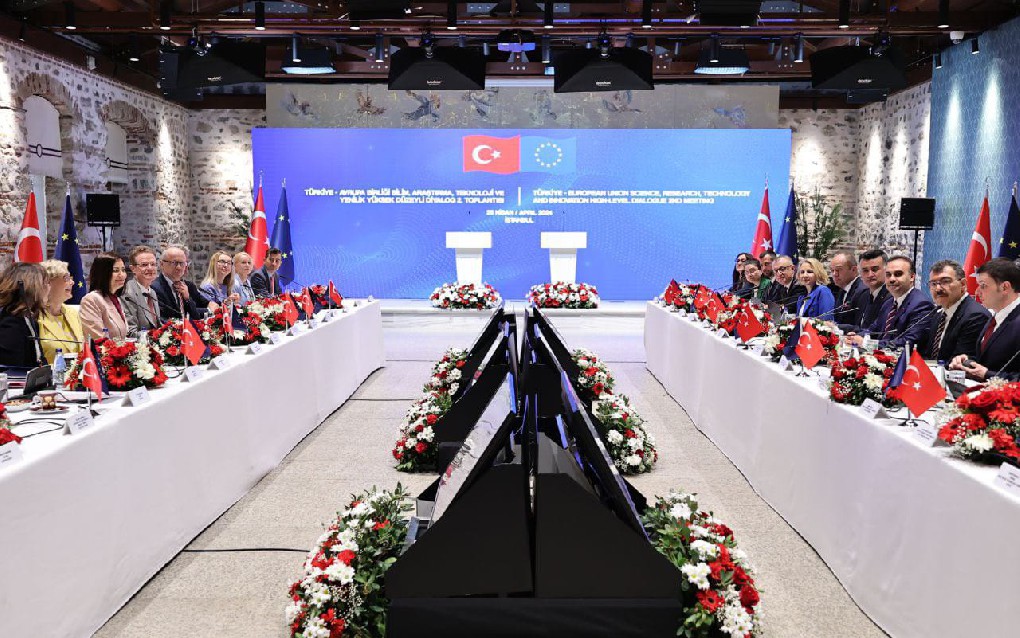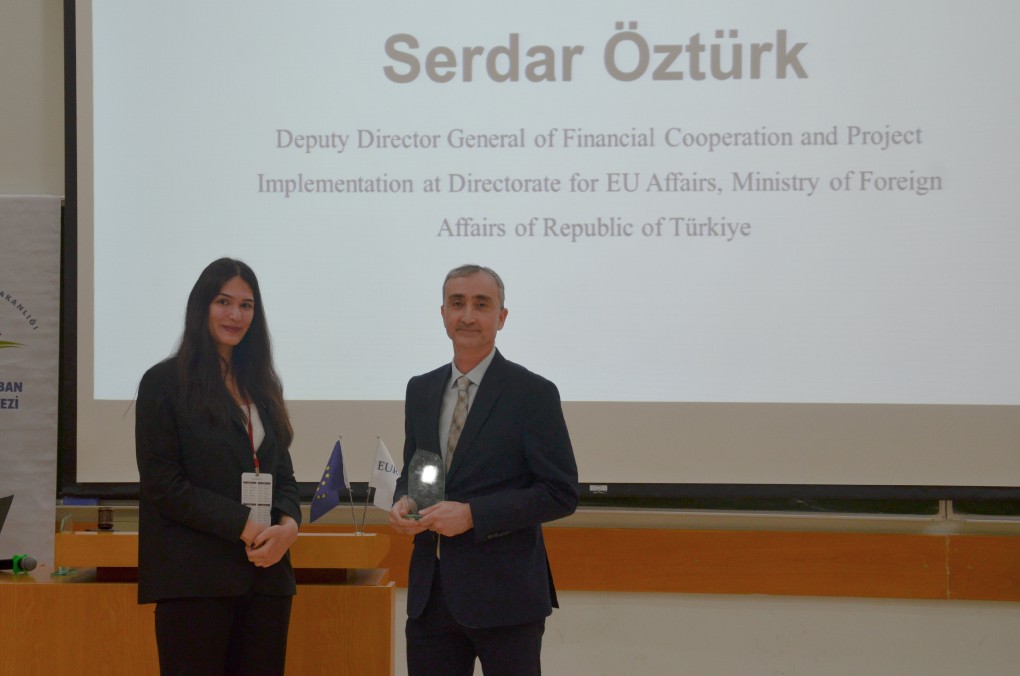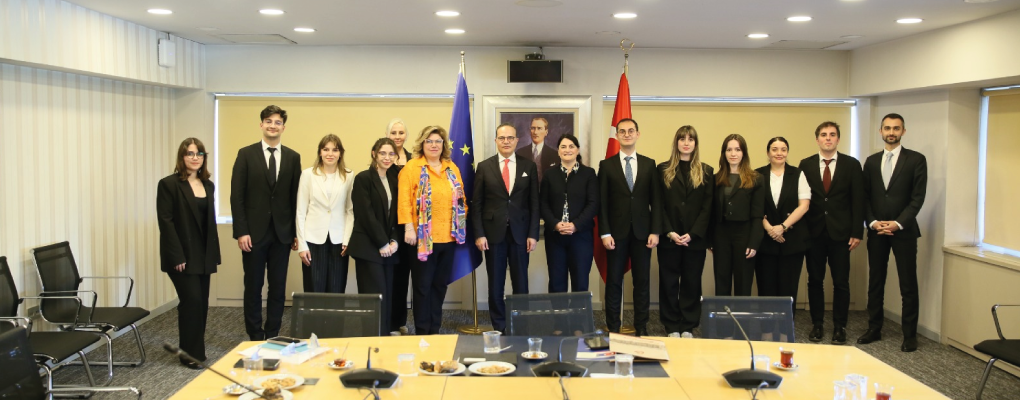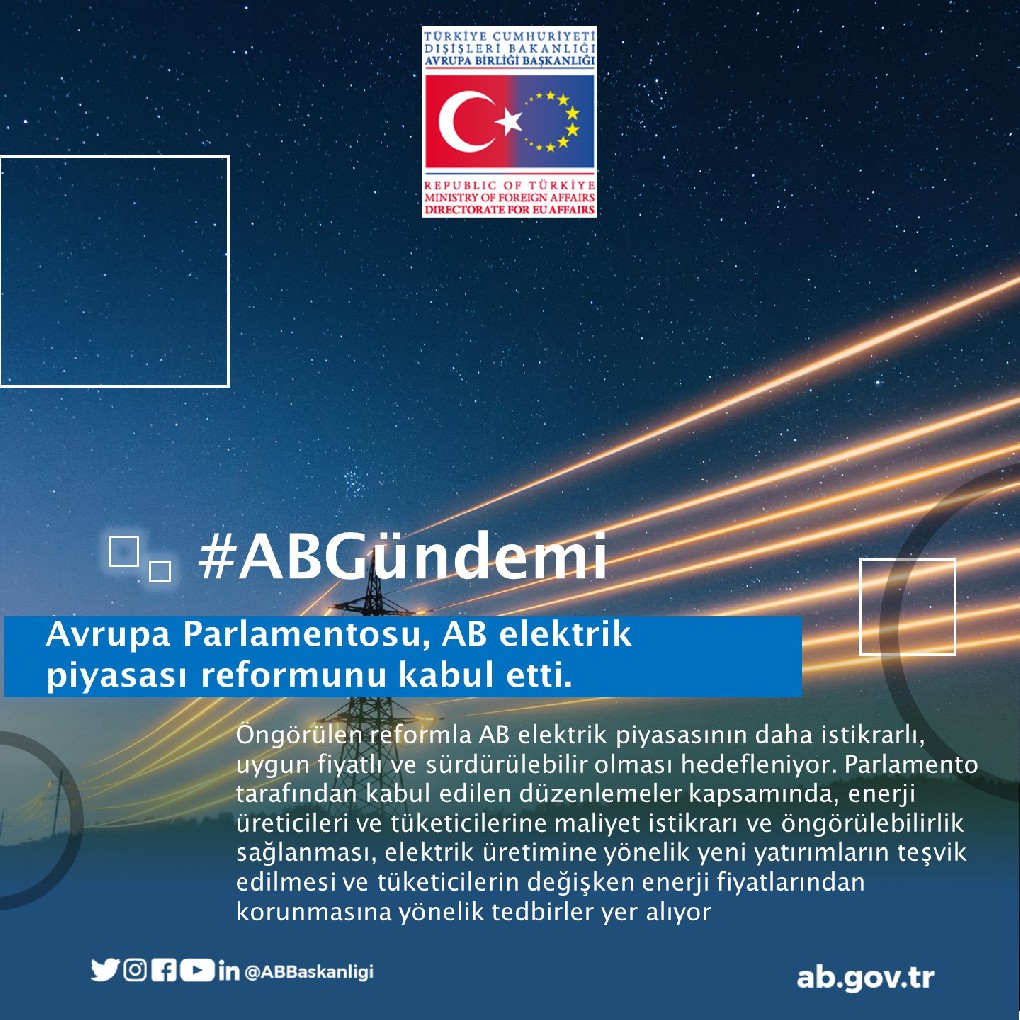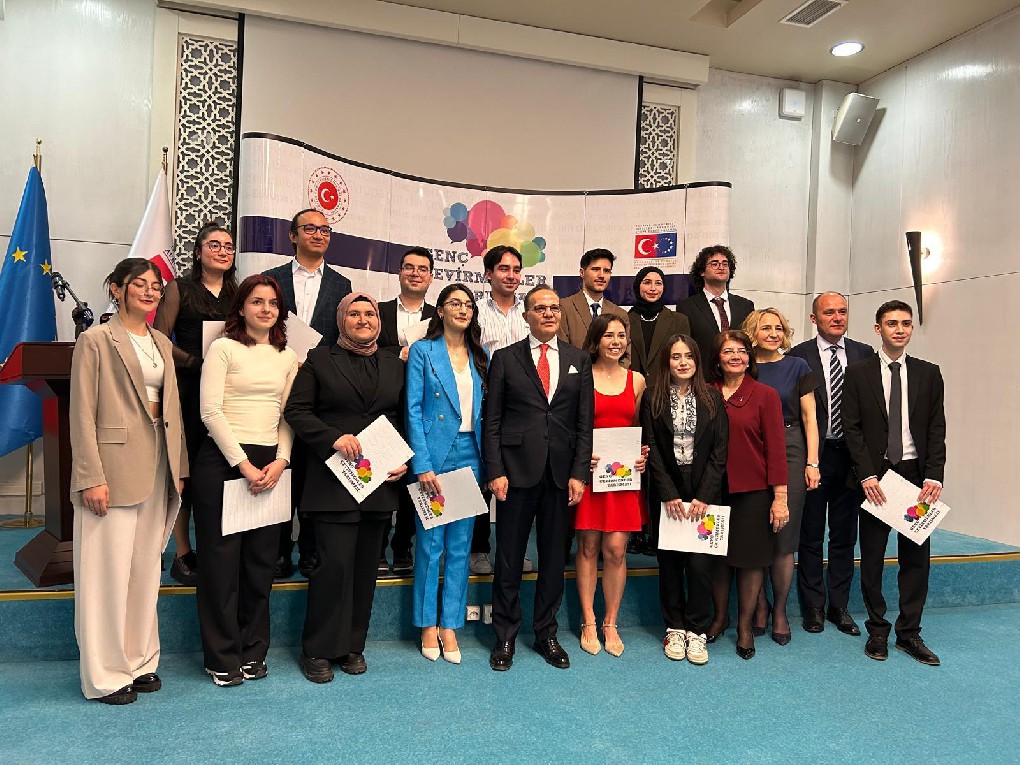- HOMEWelcome
- DIRECTORATE FOR EU AFFAIRSStructure
- E.U.Structure
- TÜRKİYE-EU RELATIONS
- History of Türkiye- EU Relations
- Main Documents
- Agreements
- Protocols
- Accession Partnership Documents
- National Programmes for the Adoption of the Acquis (NPAA)
- Türkiye Reports Prepared by the European Commission
- Enlargement Strategy Papers
- Türkiye’s National Action Plan for the EU Accession
- Türkiye’s National Action Plan for the EU Accession (2021-2023)
- Association Council Decisions
- Documents on Türkiye-EU Summits
- Institutional Structure
- Customs Union
- Türkiye- EU High Level Dialogue Meetings
- DATASources
- MEDIANews
- CONTACTContact Us
24th Reform Monitoring Group Meeting
The 24th meeting of the Reform Monitoring Group (RMG), which was established in 2003, was hosted in Konya by Ahmet Davutoğlu, Minister of Foreign Affairs, with the participation of Sadullah Ergin, Minister of Justice, Egemen Bagis, Minister for EU Affairs and Chief Negotiator, İdris Naim Þahin, Minister of Interior and Efkan Ala, Undersecretary of the Prime Ministry.
24th Reform Monitoring Group Meeting
Press Statement
Konya, 18 December 2011
The 24th meeting of the Reform Monitoring Group (RMG), which was established in 2003, was hosted in Konya by Ahmet Davutoğlu, Minister of Foreign Affairs, with the participation of Sadullah Ergin, Minister of Justice, Egemen Bagis, Minister for EU Affairs and Chief Negotiator, İdris Naim Þahin, Minister of Interior and Efkan Ala, Undersecretary of the Prime Ministry.
Afif Demirkıran, co-Chairman of Türkiye-EU Joint Parliamentary Committee and Mehmet Sayım Tekelioğlu, Chairman of the EU Harmonization Committee of the Turkish Grand National Assembly (TGNA) have participated in the meeting, demonstrating the remarkable support of the TGNA in Türkiye's EU accession process.
High level officials from Ministry of Justice, Ministry for EU Affairs, Ministry of Interior, Ministry of Foreign Affairs, Ministry of Interior and Undersecretariat of the Prime Ministry have also participated in the meeting.
The EU is currently going through what might be the most serious economic and financial crisis in its history with serious political implications and is struggling to shape its future. Türkiye, regardless of these developments that have negative effects on Türkiye-EU relations, will continue on its reforms in the EU accession process.
Any step taken in the framework of political reforms in Türkiye's EU accession process, which is our priority, aims to protect human rights in all areas, strengthen democracy and the principle of the rule of law.
Our reforms have continued after the 2010 Constitutional amendment package, which has been a milestone of the political reform process. 2011 has been a year of judicial reform. The objectives of the Judicial Reform Strategy, adopted by the Government in 2009, has been realized to a great extent. The Strategy is being updated.
In this meeting of the Reform Monitoring Group, which is the last RMG in 2011, we have taken decisions on the work which will be accelerated in 2012.
"Positive Agenda", proposed by the European Commission in the 2011 Enlargement Strategy, has been discussed in detail. Positive Agenda cannot be an alternative to the accession negotiations but should be supportive and complementary to this process. It has been agreed to strengthen the current mechanisms of cooperation with the Commission in critically important areas and to establish "working groups" in politically blocked chapters, in particular the Chapters on "Judiciary and Fundamental Rights" and "Justice, Freedom and Security".
The RMG has also comprehensively addressed the steps to be taken in the forthcoming period, inter alia detention periods, freedom of expression and protection of personal data.
The positive results of the arrangements addressing lengthy trial periods in the framework of the Judicial Reform Strategy, which is the main reason for the problem of detention periods, will be observed in 2012.
Ministry of Justice is preparing an Action Plan on Freedom of Expression to resolve the problems arising from legislation and implementation in the area of the freedom of expression and the media.
Draft law on the protection of personal data is prepared by the Ministry of Justice and will be submitted to the TGNA as soon as possible.
Two laws regarding the improvement of the judiciary were enacted in 2011. Another draft law in this area prepared by the Ministry of Justice will be submitted to the TGNA as soon as possible.
In order to decrease the number of applications pending before the ECtHR and prevent decisions of violation to be taken against our country, Human Rights Action Plan is being prepared by the Ministry of Justice with the support of relevant institutions and high judicial bodies, taking into account the output of the workshop titled "ECtHR Rulings on Türkiye: Problems and Solutions" organized on 15-17 November 2011.
The necessary efforts concerning institutionalization in the field of human rights will be made, including the establishment of an Ombudsman institution, Turkish National Human Rights Institution, Monitoring Committee for Law Enforcement Officers, Anti-discrimination and Equality Board. The remaining work will be completed in order to introduce a holistic approach to human rights in our administrative structure.
Draft Law regarding the establishment of the Monitoring Committee on Law Enforcement Officers has been prepared by the Ministry of Interior. Draft Law on Anti-discrimination and Equality Board has also been prepared in order to ensure the effective implementation of the equality principle and anti-discrimination rule stated in Article 10 of the Constitution.
Furthermore, an international seminar will be held tomorrow (19 December) on the establishment of an independent national human rights institution in Türkiye, with the participation of representatives from civil society and foreign national experts under the coordination of the Ministry for European Affairs and with the cooperation of the Prime Ministry Human Rights Presidency.
The legislative amendments and changes in enforcement that need to be undertaken in order to implement the decisions of the European Court of Human Rights has been addressed.
The work carried out by our Government within the scope of strengthening religious freedoms in Türkiye is underway. The process of dialogue with our citizens of different faiths is also continuing. In this framework, Mr.Egemen Bağıþ, Minister for European Affairs and Chief Negotiator, will get together with the representatives of different faiths in January 2012.
The Jewish Community in İzmir has been registered under the name of the "İzmir Jewish Community Foundation" and has obtained legal personality with the decision of the Foundations Council. The long-standing problem on the legal personality and foundation status of the İzmir Jewish Community which was not included in the 1936 Declarations has been resolved. Our Government is fully committed to ensure that all citizens fully exercise fundamental rights and freedoms without discrimination.
Work is underway on the Chapter on "Justice, Freedom and Security" which includes important issues such as visa, migration and border management.
Our Government is closely following the efforts of the European Commission to improve the visa regime for Turkish citizens. However, the application of the visa code regulation to Türkiye that is applied to third countries cannot be deemed as an improvement.
Visa applied against Turkish citizens does not have a legal basis. It is not fair in terms of our commercial relations. Therefore, Türkiye hopes that the Justice and Home Affairs Council of the European Union will immediately give a mandate to the European Commission to initiate the process for visa liberalisation.
We are determined that the process for conclusion and approval of the Readmission Agreement will be carried out in parallel with the mandate to be given to the European Commission by Member States to prepare and submit a roadmap on the visa-free regime for Turkish citizens.
In the conclusions of the European Council held on 8-9 December 2011, Türkiye was defined as the "country of origin" of illegal immigration to the EU. With its high level of economic growth and strengthening democracy over the last decade, Türkiye is no longer a country of origin for irregular immigration today; on the contrary, it has increasingly become a country of destination. Defining Türkiye as a "country of origin" is not acceptable.
Our Government continues to deal with irregular immigration effectively through amendments in legislation and measures taken. However, taking into account the trans-border nature of the issue, effective action against irregular immigration can only be carried out through fair burden-sharing by the EU, Türkiye and even other countries on the same route of migration.
Work for the establishment of a comprehensive policy and legislation on immigration and asylum is currently being carried out by the Ministry of Interior in order to establish the legal and institutional structure. In this framework, the draft "Law on Foreigners and International Protection" has been prepared with the effective cooperation of all national and international stakeholders through a participatory process.
Work is also underway on the draft "Law on the Fight against Human Trafficking and Protection of Victims". It has been agreed that the work on two drafts will be carried out and completed together.
Work on the integrated border management, which will enable more effective protection of our land and sea borders, is currently underway. The draft "Law on the Organization and Duties of the Directorate General for Border Security" envisages the establishment of a well-equipped law enforcement body, which will be assigned to land and sea borders as well as border gates of Türkiye. The draft law has been prepared and will be submitted to the TGNA following consultation with relevant institutions.
Taking into account the sensitivity of the public on animal rights, the relevant legislation should be implementated diligently. Efforts to increase the penal sanctions towards those who are cruel to animals shall be promoted.
The steps taken to ensure the highest level of standards for our citizens, which is the utmost priority and objective of our Government, are also a part of our accession process. Türkiye will continue to work with determination to attain its objective of full membership to the EU.
The meetings of the Political Affairs sub-Committee (SİYAK), held within the scope of the work of the Reform Monitoring Group and comprised of high-level officials of relevant bodies will be held more frequently.
Within the scope of the political reforms, the most important and primary expectation of the Turkish people in the forthcoming period is the preparation of a new civilian Constitution. For this purpose, a Conciliation Commission has been established in which there are three members from each party, regardless of the number of seats held by the party in the TGNA.
We aim to have a more liberal new Constitution, which will be prepared with full civil initiative and active support of all parties and enshrine the separation of powers. We wholeheartedly believe that a Constitution which reflects the will of our people is an indispensable element of our democracy.
We would like to once again invite all our citizens, including all non-governmental organizations and universities, to provide their active support in this process.
The 25th meeting of the RMG will be hosted by Egemen Bağıþ, Minister for EU Affairs and Chief Negotiator on 16 or 17 March 2012 in İstanbul. The 26th RMG meeting will be hosted by İdris Naim Þahin, Minister of Interior, in June in Ordu.

